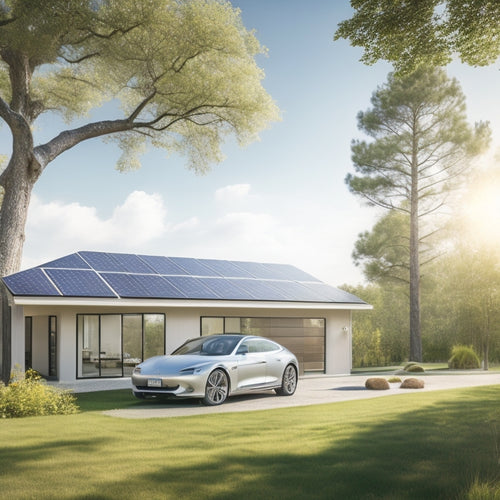
What Is the Typical Home Solar Panel Warranty?
Share
You can anticipate a typical home solar panel warranty to last between 25 to 30 years, safeguarding your investment against defects and degradation while ensuring energy independence and peace of mind. This warranty period provides protection against faulty components and installation errors, excluding damage from natural disasters or intentional harm. With a typical warranty, you're guaranteed at least 80% power output after 25 years. As you explore your solar panel options, you'll want to comprehend the warranty details, including workmanship and extended warranty options, to make sure you're fully protected and informed about your investment.
Key Takeaways
• A typical home solar panel warranty lasts between 25 to 30 years, providing protection against defects and degradation.
• Some manufacturers offer extended warranties up to 40 years, ensuring long-term peace of mind for homeowners.
• The warranty covers defects in materials and workmanship, including faulty components and installation errors.
• Manufacturers guarantee at least 80% power output after 25 years, with a module degradation rate not exceeding 0.5% to 0.7% per year.
• Workmanship warranties, typically ranging from 1 to 10 years, guarantee installation quality and system performance.
Residential Solar Panel Warranty Duration
When purchasing a residential solar panel system, you can typically expect a warranty that lasts between 25 to 30 years, providing you with a quarter-century of protection against defects and premature degradation. This lengthy warranty period is crucial, as it ensures you reap the benefits of solar savings without worrying about warranty woes.
With installation costs spread out over several decades, the initial investment becomes more manageable. Moreover, having a reliable warranty in place lets you focus on enjoying the perks of energy independence, rather than stressing about potential system failures.
As you embark on your solar journey, it's essential to understand that a comprehensive warranty is vital in safeguarding your investment. A reputable manufacturer will stand behind their product, offering a warranty that covers both parts and labor. This not only provides peace of mind but also protects your wallet from unexpected repair costs.
Typical Warranty Period for Solar Panels
As you evaluate solar panel systems, you'll find that the typical warranty period for solar panels ranges from 25 to 30 years, with some manufacturers offering extended warranties of up to 40 years or more. This lengthy warranty period provides homeowners with peace of mind, knowing they're protected against defects and performance issues.
Industry standards dictate that solar panels should last for at least 25 years, and manufacturers are confident in their products' ability to meet this threshold. Government incentives, such as the Solar Investment Tax Credit, also encourage the adoption of solar energy, which has driven innovation and improved system design.
Regular maintenance schedules help ensure peak performance, minimizing the environmental impact of your solar panel system. With financial benefits like reduced energy bills and increased property value, it's no wonder solar panels have become a popular choice for eco-conscious homeowners.
As technological advancements continue to improve efficiency and durability, you can trust that your solar panel system will provide clean energy for decades to come.
Manufacturer Warranty Coverage Details
You can expect manufacturer warranties to cover defects in materials and workmanship, ensuring that you're protected against faulty components and installation errors. This means that if your solar panels malfunction or fail due to manufacturing defects, the manufacturer will repair or replace them free of charge. However, it's important to review the warranty terms to understand what's covered and what's not.
Here's a breakdown of what you can typically expect from a manufacturer warranty:
| Warranty Coverage | Details |
|---|---|
| Defects in Materials | Covers faulty components, such as solar cells or inverters |
| Workmanship | Covers errors during installation, such as faulty wiring |
| Warranty Exclusions | Typically excludes damage from natural disasters, animal infestations, or intentional damage |
Keep in mind that warranty exclusions may apply, and it's vital to review the policy carefully. Additionally, manufacturer warranties are usually transferable, so if you sell your home, the warranty can be transferred to the new owner. This can be a significant selling point, as it provides peace of mind for potential buyers.
Performance Warranty Expectations
When reviewing a solar panel warranty, you'll want to examine the performance warranty expectations, which outline the manufacturer's guarantees for the system's energy output and module degradation rate.
These expectations typically include an energy output guarantee, ensuring your system produces a certain amount of energy, and a module degradation rate, which details the rate at which the panels' efficiency declines over time.
Energy Output Guarantee
Solar panel manufacturers typically provide an energy output guarantee, which assures that the system will produce a certain percentage of its rated power over the warranty period. You want to know that your solar panels will perform as promised, and this assurance gives you that peace of mind.
Typically, manufacturers guarantee that their systems will produce at least 80% of their rated power output after 25 years. This means that if your system is rated for 10 kilowatts, it should still produce at least 8 kilowatts after 25 years.
To maintain this level of performance, manufacturers use predictive modeling and efficiency metrics to optimize their system design. They also conduct rigorous testing to identify and mitigate potential issues. This attention to detail and commitment to quality gives you confidence, knowing that your solar panels will continue to generate clean energy for years to come.
Module Degradation Rate
Manufacturers typically guarantee that their solar panels will degrade at a rate of no more than 0.5% to 0.7% per year, ensuring that their system's performance remains at its peak over the warranty period. This degradation rate is a result of environmental factors, such as temperature fluctuations, humidity, and exposure to UV radiation, which can affect the panel's efficiency over time.
| Year | Degradation Rate | Performance Level |
|---|---|---|
| 1 | 0.5% | 99.5% |
| 5 | 2.5% | 97.5% |
| 10 | 5.0% | 95.0% |
As you can see, even after 10 years, the solar panels are expected to retain at least 95% of their initial performance. The thermal impact of high temperatures can also affect the degradation rate, but most manufacturers design their panels to withstand these conditions. By understanding the module degradation rate, you can better appreciate the performance warranty offered by manufacturers and make informed decisions when investing in a solar panel system.
Workmanship Warranty and Labor
Your solar panel installation company typically backs its work with a workmanship warranty, guaranteeing that the installation is free from defects in labor for a specified period, usually ranging from 1 to 10 years. This warranty provides you with peace of mind, knowing that the company stands behind its craftsmanship standards. If any issues arise due to faulty labor, you're covered, and the company will correct the problem without additional labor costs.
The workmanship warranty is a critical aspect of your solar panel warranty, as it directly affects the overall performance of your system. A reputable installer will provide a thorough warranty that covers any defects in labor, ensuring that your system operates at peak levels. This warranty also gives you leverage to hold the installer accountable for any subpar workmanship.
Extended Warranty Options Available
Beyond the standard warranty, you can opt for extended warranty options that provide additional protection and peace of mind, often covering repairs and replacements for an extended period. These premium protection plans can give you a sense of security, knowing that you're covered in case anything goes wrong.
Here are some benefits you can expect from extended warranty options:
- Extended warranty periods, often up to 25 years or more
- Coverage for parts and labor costs for repairs and replacements
- System upgrades and enhancements to keep your system running efficiently
- Priority customer support and dedicated technical assistance
With extended warranty options, you can enjoy additional peace of mind, knowing that you're protected against unexpected expenses and system downtime.
It's like having a safety net for your solar panel system, ensuring that you can continue to reap the benefits of renewable energy without worrying about the what-ifs.
Frequently Asked Questions
Can I Transfer My Solar Panel Warranty to a New Homeowner?
When you sell your home, you're probably wondering if you can transfer that sweet solar panel warranty to the new homeowner. Good news: most manufacturers allow transfers, which can boost your resale value and even impress during home inspections!
Are Warranty Claims Typically Handled Quickly and Efficiently?
When you need to file a warranty claim, you'll appreciate manufacturers that prioritize Warranty Transparency, ensuring Claim Expediency; you'll get back to harnessing the sun's energy in no time, without excessive paperwork drama.
Do Warranties Cover Damage From Natural Disasters or Severe Weather?
When disaster strikes, you're not left high and dry - most solar panel warranties cover damage from natural disasters or severe weather, thanks to "Storm Chasers" and "Disaster Relief" clauses that've got your back.
Can I Cancel My Extended Warranty if I'm Not Satisfied?
"If you're experiencing warranty regret, don't fret! You can usually cancel your extended warranty if you're not satisfied. Check your contract for a satisfaction guarantee, and breathe a sigh of relief knowing you can back out without breaking the bank."
Are There Any Additional Fees Associated With Warranty Claims?
"When filing a warranty claim, you'll likely encounter additional fees, such as service charges and filing costs, which can add up quickly, so be prepared to budget extra for these hidden expenses."
Related Posts
-

Why Invest in Solar Car Battery Chargers Online?
By investing in a solar car battery charger online, you're not only reducing your reliance on fossil fuels but also o...
-

Top 10 DIY Conversion Kit Reviews and Tips
You're taking the first step towards electrifying your ride, and with the right DIY conversion kit, you'll be cruisin...
-

Why Cities Need Smart Charging Infrastructure Now
You're about to experience a tidal wave of electric vehicles hitting your city's streets, and it's essential you're p...


